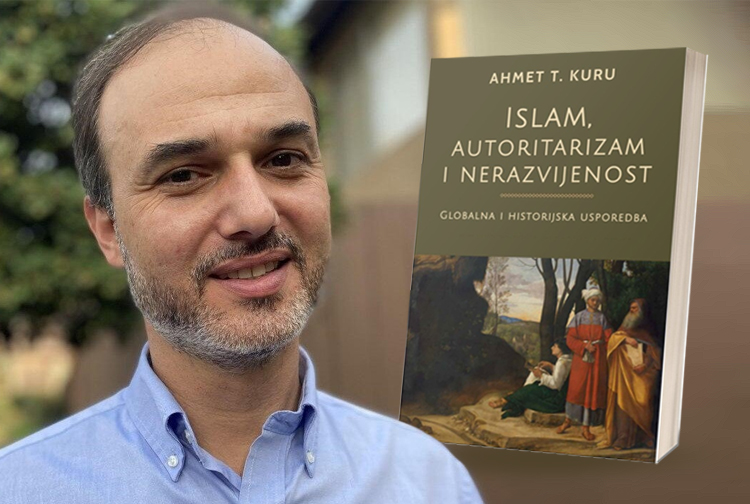
Ahmet Kuru, a professor of political science and the director of Center for Islamic and Arabic Studies at San Diego State University, USA, promoted his most recent book 'Islam, Authoritarianism, and Underdevelopment: A Global and Historical Comparison', which was also translated into Bosnian. Prof. Kuru came to Bosnia on July 25 and gave a public talk organized by the University of Sarajevo, Faculty of Political Sciences. Kuru talked to N1's Nikola Vucic.
Islam, authoritarianism and underdevelopment is the title of your book recently translated and promoted in Bosnia and Herzegovina, a European democratic Muslim majority country. What is the connection between these three elements that you highlight in the title of the book?
Kuru: There are 50 Muslim-majority countries in the world; according to Freedom House, only six of them are considered as electoral democracies: Bosnia, Albania, Kosovo, Indonesia, Senegal, and Sierra Leone. Nonetheless, more than half of all countries in the world are electoral democracies. This indicates that the Muslim world has a disproportionately high level of authoritarianism in comparison to the rest of the world. Additionally, many Muslim-majority countries have lower scores than the world averages in terms of socio-economic development regarding the criteria of GDP per capita, life expectancy, literacy rate, and average year of schooling.
Thus, my book asks, what explains the gap of democracy and development in the Muslim world? Some analysts have pointed to Islam as the barrier of democracy and development. My book explains in detail that this is a misleading claim. Islam was a very egalitarian and progressive religion between the seventh and eleventh centuries. That is how Muslims produced world's leading philosophers and merchants during those centuries.
Islamic thought contributed a lot to the development of modern civilization as we know it, especially in regard to philosophy, art, but also science. Yet, Muslim majority societies often seem to be portrayed as “backwards” in the discourse on modern civilisation. Does this kind of thinking have any basis in reality? What could be the reason for it?
Kuru: The problem of “backwardness” has been well known and acknowledged in the Muslim world since the eighteenth century. Ottoman statesmen in Istanbul initiated several reforms to catch up with the developments in Western Europe, such as opening the first Muslim-run printing press in Istanbul, 287 years after the first Western European printing press. Additionally, the Ottomans initiated some military reforms. In the nineteenth century, the Ottoman Tanzimat reforms and Muhammad Ali Pasha’s reforms in Cairo meant that Muslim rulers acknowledged their problem of backwardness vis-à-vis rapidly developing Western Europe.
In terms of scholarship, since the late fourteenth century, Muslim thinkers discussed the problem of backwardness in comparison to early Muslims’ philosophical achievements between ninth and twelfth centuries. In his famous book Muqaddima (1377), Ibn Khaldun noted that even in Islamic sciences, Muslims were no longer producing leading scholars. He refers to Tusi as the last great Persian philosopher.
My book explains how Muslims taught Western Europe mathematics, medicine, Aristotelian philosophy, agriculture, and paper making between ninth and twelfth centuries. Yet, later on, the Muslim world experienced a scientific stagnation. After Ibn Khaldun (d. 1406) in history, Ali Kushji (d. 1474) in astronomy, and Taftazani (d. 1390) and Jurjani (d. 1414) in theology, Muslim societies very rarely produced scholars in that caliber, with few exceptions such as Takiyuddin (d. 1585) in astronomy and Mulla Sadra (d. 1640) in philosophy.
Hence the term “backwardness” does not simply refer to Muslim societies’ lower levels of development in comparison to Western and some other societies, but it also refers to contemporary Muslim societies’ stagnant intellectual life, which can be defined “backward” in comparison to early Muslim societies, who were very creative between the ninth and twelfth centuries.
How would you differentiate between Islamophobic discursive strategies that portray Islam in a certain way from the perspective of “Western privilege” and scholarly criticism that actually has relevance?
Kuru: There are Islamophobes in both political parties and academia in different parts of the world. They attack Islam without knowing its rich history and theological diversity. This is different from a scholarly critique, which is based on data and has an analytical value. I am a practicing Muslim and a social scientist. I am criticizing Muslim societies to help hem fix their problems. The first step is to acknowledge the existence of problems without labeling critical analysts as “Islamophobic,” “Orientalist,” etc. in a simplistic manner.
Among academic circles, we can often hear criticism of Western imperialism, which Muslim societies rightly resist – do you agree with this argument and do you see an alternative to so-called Western values?
Kuru: Western colonialism meant the exploitation of natural resources and labor of millions of people in Americas, Africa, and Asia. This has continued for centuries. Today, formal colonialism is rare but informal ways of imperialism still exists. This should be criticized and resisted.
Meanwhile Muslims should not forget two important points. First, Western imperialism is not the only type of domination. Chinese imperialism is also real and dangerous as seen in the ongoing cultural genocide against 10 million Uyghurs in China. Russian imperialism is also real and notorious, which was observed during the time of the Soviet Union and it is still visible in a large geography from Chechnya to Ukraine.
Second, if Muslims only focus on imperialism, they may forget their internal problems. In fact, Muslims’ domestic problems, in terms of their own ideas and institutions, make them weak against imperialists. So, they ought to fix these problems to be stronger against imperialists.
A major problem in the Muslim world is –-what I call—the ulema-state alliance. Until the eleventh century, Muslim societies had certain levels of autonomy between political, religious, economic, and scholarly classes. For about five centuries, the religious class (the ulema) refused to serve the state. But after the eleventh century, a strong alliance began to emerge between the ulema and the state and this alliance marginalized merchants and philosophers in the Muslim world. From that time to the present, this is the main reason for the economic and intellectual stagnation in most Muslim-majority societies. Muslims may focus on this problem if they want to achieve democracy and development.
Some of our readers might think that there is currently a crisis regarding Western values and perceive that there is a great amount of hypocrisy when westerners use them in order to get a point across. What are your thoughts on this?
Kuru: There are multiple crises in all regions of the world. The answer to your specific question about the West depends on how we define “Western values.” If Western values mean the military domination of other countries, economic exploitation of natural resources, etc., then, yes, there is a big crisis. Western military power has produced hostility against the West in the rest of the world. It also resulted in disastrous, such as the invasions of Iraq and Afghanistan.
Yet, if “Western values” mean separation of powers, checks and balances, freedom of speech, property rights, women’s rights, human rights, then, I would say “no.” There is no crisis about these values. In fact, they are the guiding principles for any society who want to achieve democracy and development.
Many have placed their hopes on Turkey, a stable, modern, strong democratic country with a majority Muslim population, becoming a member of the European Union. It has been decades since this country was granted candidate status, but the idea of EU membership still seems far away. How do you comment on that? Do you think that Erdogan distanced Turkey from the EU in terms of values, the country’s human rights record and the state of media freedom under his rule?
Kuru: I was one of the people who were optimistic about the future role of Turkey at the global stage. I am no longer optimistic on that. Turkey now has a deep economic crisis. Inflation is more than 80% annually. Turkey has a record number of journalists in prison. The political system is based on superpowers of one man. Anti-Westernism is also very much embedded in Turkish society which is another reason why Turkey’s full membership to European Union is no longer possible.
I suppose you have familiarised yourself with the social dynamics in Bosnia and Herzegovina. Do you see opportunities for the country to achieve progress? Did you identify progressive forces could take the lead in this effort?
Kuru: I spent five days in Sarajevo and Mostar, where I observed the deep hospitality of Bosnian people and their rich history which gives hope for their future. I also learnt how the ulema-state relations are based on the “Raisu-l-Ulama” institution, which maintains a certain level of autonomy of the ulama from the state. Such an autonomy is crucial according to my book for a society’s flourishing. My book also argues that early Muslims’ philosophical and socioeconomic achievement was based on their toleration of diversity. After the eleventh century, however, the ulema-state alliance emerged and promoted intolerance through apostasy laws and other discriminatory rules. Today, Muslim societies should remember their pre-eleventh century historical roots by re-establishing autonomy between political, religious, economic, and intellectual classes and by reviving toleration of diversity. Bosnia can play an important role in the future for such a reform in the Muslim world.





Kakvo je tvoje mišljenje o ovome?
Budi prvi koji će ostaviti komentar!